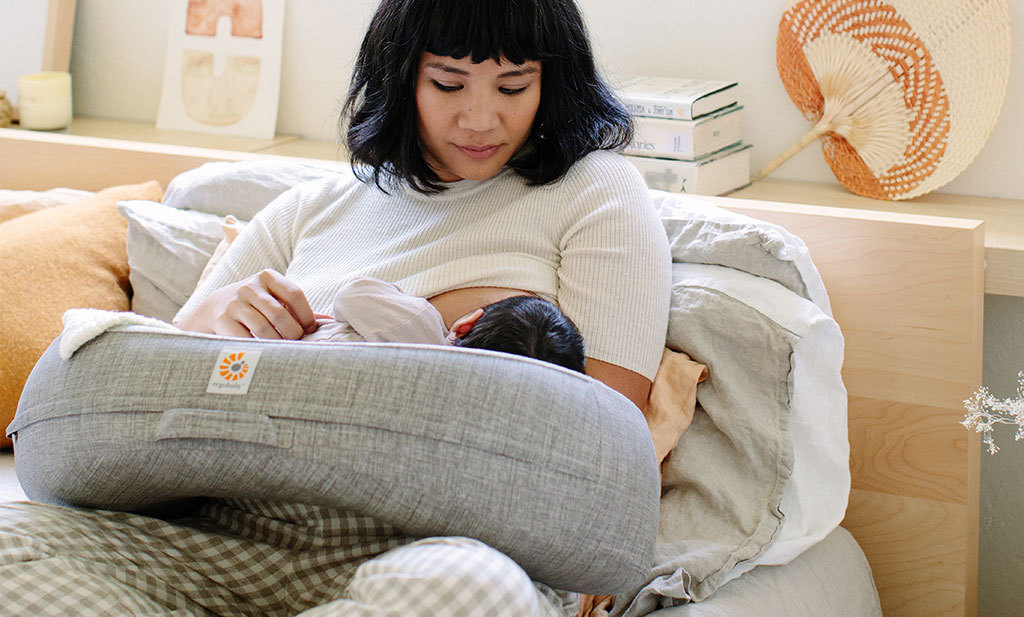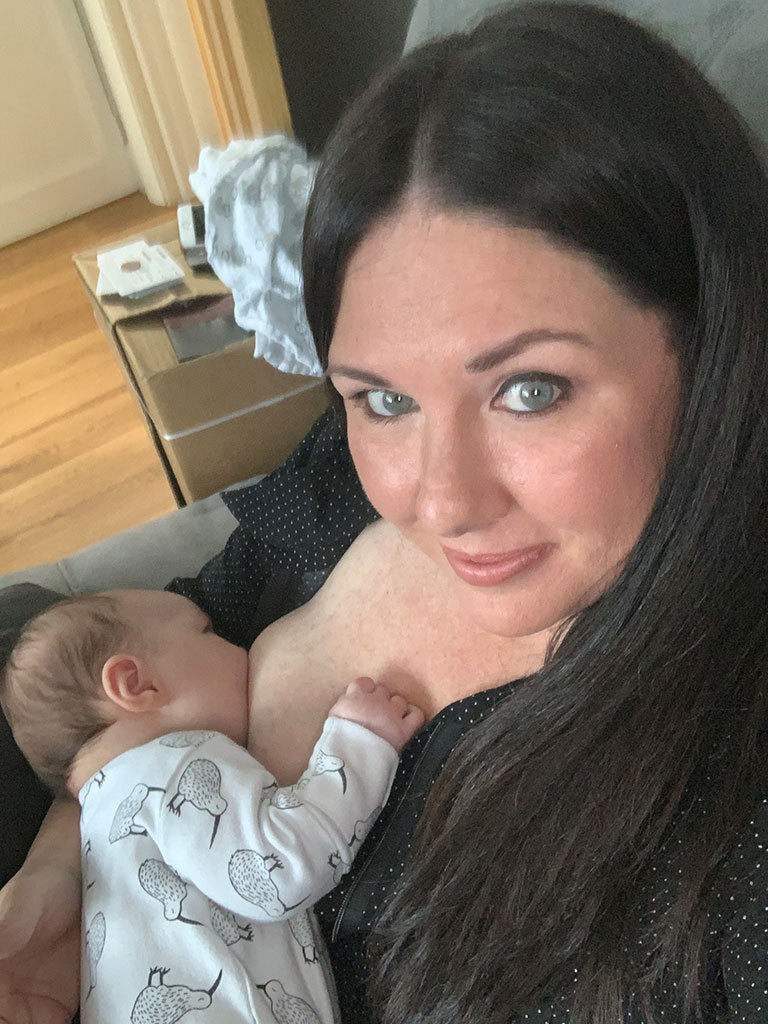
Breast/chest feeding is very beneficial for your baby. That’s why World Breast/Chest Feeding Week is being celebrated again from the 1st until the 7th August celebrate all things feeding.
This year’s theme is “Breast/chest feeding at work – know your rights”. If you are planning to return to work, training, or education whilst breast/chest feeding, the NHS states you can ask your employer or college for flexible working hours arranged around your breast/chest feeding needs.
While we’re on the subject of “work”, we thought we’d share with you some insights from our Ergobaby employees’ personal experiences with breast/chestfeeding to give you some top tips.
Secret #1: “Don’t listen to others, listen to your own feeling”.
“I was always afraid to eat anything when I was breastfeeding because my mum had told me not to eat onions, garlic etc. to avoid my baby getting tummy aches. But I realised quickly that I had to do what felt right for me. After all, as mamas we have instincts in us and therefore automatically decide what is right for us and our baby. My friend from Morocco brought me a traditional onion cake on the second day after giving birth, which they serve to all women in her home country after giving birth. That was a shock for me! On the other hand, it also cured me of believing everything I hear or read. That’s why my tip is: don’t listen to others, trust your instincts!” (Magdalena, Hamburg/Germany, mother of 2 children).
Secret #2: “Pain while breastfeeding means something is wrong”.
“I had excruciating pain and trauma to my nipples due to my daughter having a shallow latch, but thought I just had to wait until my nipples “hardened” or I got used to it. I now know that pain is common but never “normal”. There is always a reason for the pain, it’s common to not be able to easily achieve a deep, effective latch but I had no idea. I’d always recommend getting help from a midwife, or better yet a specialist lactation consultant (the most qualified are IBCLCs), early on. I was so worried about not having enough milk that I pumped too early, which led to overproduction. I assumed that the fuller my breasts were the better, as I had heard so much about low supply that I was excited when they felt “full”. However, it made everything worse. My daughter couldn’t latch properly as they were so swollen, which led to even more pain. It also meant she struggled to feed effectively so it all just felt “wrong”. I was lucky as my midwifery team sent me a midwife who specialised in breast/chest feeding but a consultation with an IBCLC early on would have been the best possible thing, for me and my baby. So, my advice is: don’t accept toe-curling pain, it is usually an indicator that something isn’t quite right. It could be an easy “fix” but getting help early and from someone who is really experienced and qualified is sure to make a real difference to your breast/chestfeeding journey, whatever you want it to look like.” (Harriet, Cornwall/UK mother to a daughter).
Secret #3: “Supplementary feeding can also have advantages”.
“I couldn’t produce enough milk and had to supplement to keep my child full. And all I can say is yes, breast milk is best – we all know that. But it’s also okay to combine breast milk and pre-milk if needed. This can even have advantages for your family life. The fact that my husband could also bottle-feed the children allowed them to develop a very intimate relationship. And of course, it made life easier for me, because we could split the shifts at night! Therefore: It is not a failure if your milk is not enough. Every millilitre of breast milk counts – and dad will be grateful to be able to be more involved in ‘breastfeeding’.” (Amanda, London/UK Mother of 2 children).

Secret #4: “Breastfeed as long as it feels right for you”.
“Breastfeeding was my wish and a joint decision with my partner.
I informed myself well during pregnancy and asked my midwife, with whom I had a very good and trusting relationship. For me, this was the basis to prepare for my breastfeeding journey, as breastfeeding is not so culturally supported in France, my home country. And this is also true for my family. For the rest, I thought I would just trust myself and my instincts, which helped me throughout the journey (14 months breastfeeding with my daughter and 2 years with my son). I really enjoyed this special time with both my children, despite the pain of milk flow in the first days and some inflammation. Every baby is different, and the relationship becomes stronger because of these special moments. Plus, there’s nothing more practical than breastfeeding! You don’t have to worry about bottles, powders, the right temperature, or anything like that – you always have everything with you on the go! This gave me great serenity. That’s why I give the tip: Yes, there are moments in breastfeeding when you will doubt: Is it right to continue, should I stop, is it still my desire? In the end, I saw external pressure as the main reason for my doubts and felt that there is still a long way to go in our Western countries to accept breastfeeding again as the most natural thing in the world. For me, therefore, two things were fundamental: my midwife and my own willingness to do what I thought was right for us.”
(Laetitia, Hamburg/Germany Mother of 2 children).
Secret #4: “Share the responsibility of feeding”.
“Yes, a female are the only ones who can produce breast milk. But it is not that you are the only one who can give breast milk to your baby. For example, my husband wanted to be involved in breastfeeding at a very early age. So, I pumped the milk, and he fed our baby from the bottle. This was great and I was able to sleep during this time, as our child usually woke up every 40 minutes at night and I had to feed him. It was a great solution for all of us. Therefore: Learn to give – or in other words – also to share. When pumping and giving bottles, your baby continues to receive the important breast milk, you get relief and dad is happy because he gets to be part of breastfeeding.” (Magdalena, Hamburg/Germany, mother of 2 children).
Secret #6: “Be well informed as a dad too”.
“Even as a dad, it is helpful not to leave breastfeeding to the woman alone. It is good to be well informed, for example, how to deal with milk retention. That way you can support your wife in the best possible way. What I didn’t realise before is that as a man it’s important to always stay as calm as possible and make sure your partner is supported and not put too much pressure on yourselves. My top tip for all the dads out there: always have a glass of water to hand when your wife starts breastfeeding. The extra fluid requirement is enormous.” (Robin, Hamburg/Germany, father of 3 children).
Secret #7: “Make yourself as comfortable as possible”.
“If you haven’t breast fed before, you simply can’t imagine how much time you really spend doing it in the first three months. Especially during the cluster feeding period, when your baby is stimulating the milk flow with frequent feeds, you may feel like you can’t stop breastfeeding. Your breasts run hot, you may walk around your home with white cabbage inside your feeding bra, dripping t-shirts and sweatpants. Often you don’t even manage to get yourself dressed – or you’re soaked again after a few hours anyway. At the beginning, I was totally frustrated because I thought I couldn’t manage anything anymore, I couldn’t eat healthy (I was just snacking) and my life wasn’t really happening. But then I started to accept the situation as it was (hopefully as a phase) and made myself as comfortable as possible. For example, I moved the TV from the living room to the bedroom because the bed was more comfortable, and I breastfed lying down to protect my back. I regularly ordered healthy food from a delivery service. It sounds expensive, but you suddenly save so much money when you don’t do anything. I also started inviting my girlfriends over to my six-foot bed in the evening to chat. I just want to say that many situations will be new for you. The more you try to maintain your old life in the early stages, the more frustration can arise. The sentence “It’s all just a phase” helped me a lot to always settle into the situation and not go crazy – even though I was a single parent from the beginning. Therefore: Make yourself as easy and comfortable as possible in every situation. It will be different again.”
(Meike, Hamburg/Germany, mother to a daughter).

Breastfeeding – not so complicated after all.
As you have read our Ergobaby colleagues have learned a lot during their breast/chestfeeding period. The most important thing is to listen to your feelings and stick together – whether it’s family, friends or medical experts advice. If everyone supports you in their own way during this time, it will be much easier.
Would you like to learn more about breast/chest feeding during World Breastfeeding Week?
Search our blog and you will find many topics about breast/chestfeeding, such as how to avoid breast/chest feeding problems.
We wish you a wonderful and successful breast/chest feeding with your little treasure.
Meta-title: Seven secrets parents-to-be, and parents should know about breast/chest feeding.



